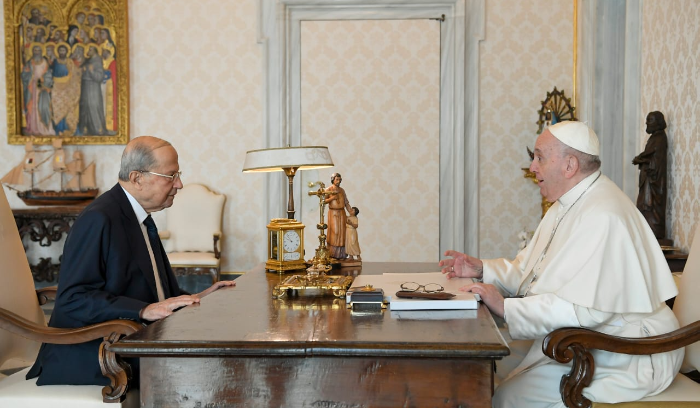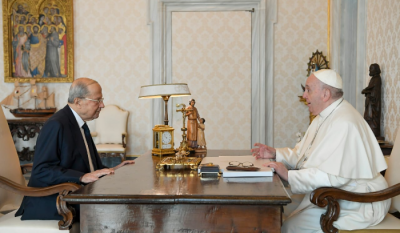Pope Francis affirmed during his meeting with President Michel Aoun this morning at the Vatican that "Lebanon holds a special place in my prayers and remains at the heart of my concerns, despite the strained international situation on multiple fronts, and it is also a focus for the Holy See."
He expressed his sorrow at "the difficult economic and social conditions in Lebanon," emphasizing that "Lebanon, with all its children, both Christians and Muslims, should not forsake the values of authenticity based on respect. It is crucial to preserve the Christian presence in the East, as it is vital to maintain coexistence in Lebanon, which has made it a message."
The Pope confirmed that he is working with everyone around the world "to preserve this country that the Holy See has long considered a message and a model." He reiterated to President Aoun his determination "now more than ever" to visit Lebanon "to revive hope within it," stating, "I will visit Lebanon soon. This is a decision I have made, as Lebanon remains a model for the world, regardless of anything."
For his part, President Aoun thanked the Pope for his reception, "especially at this delicate international juncture, notably in Europe, due to the repercussions of the war in Ukraine." He also expressed gratitude for "the immense love you have shown to Lebanon on numerous occasions, particularly by dedicating a full day for prayer and reflection for Lebanon at the Vatican last July." He thanked the Pope for sending both Cardinal Pietro Parolin and Monsignor Paul-Richard Gallagher to Lebanon in less than a year "to stand by its people during the challenging conditions they are experiencing." He stated, "The Lebanese people hold your Holiness in the highest regard and appreciation for your solidarity with them during this unprecedented crisis. They will not forget the material and financial assistance provided by the Holy See, either directly or through church institutions and associations, especially to students."
President Aoun stressed "the importance of the attention that your Holiness and the Holy See pay in following up on everything that helps enhance stability in Lebanon and enables it to reclaim its role in its environment and the world." He asserted that "Lebanon is suffering greatly and is in urgent need of your continued support. It is going through a difficult period, but it will inevitably overcome it with the collective will of its people."
He stated, "We do not want Lebanon, caught in a vortex of conflicts and wars, to pay the price for what is happening in the region, and thanks to your care and the determination of its children to rise again, it is not abandoned to its fate."
During the discussions, President Aoun presented to the Pope an overview of the situation in the Middle East in general and Lebanon in particular, discussing the factors that exacerbated the crises that peaked due to mismanagement over decades, the implications of the Syrian displacement, while Western countries provide aid to them without extending similar assistance to Lebanese citizens, which has contributed to the accumulating burdens on Lebanon, in addition to the COVID-19 pandemic and the Beirut port explosion, which have led to numerous negative consequences. He remarked, "We have recently witnessed a massive wave of migration abroad affecting the country's elites, which poses a risk to identity and plurality in Lebanon and contributes to weakening the Christian presence in the East."
They also discussed the efforts being made in Lebanon to develop a recovery plan aimed at its revival, "in support of those who, despite everything, remain attached to the land of their ancestors, the land that Christ and the apostles walked on, as a precursor to moving towards reconstruction." He pointed out that "Lebanese, both Christians and Muslims, are suffering from the results of these crises, and they are determined together to overcome them."
Moreover, the President requested the Pope "to continue supporting Lebanon and to advocate for it in international and regional forums," to which the Pope responded affirmatively. He reiterated the official invitation for the Pope to visit Lebanon, which he had previously extended, saying, "The suffering Lebanon looks forward to your visit as a living symbol of its revival. Your Holiness, you have visited most countries in the region except Lebanon, and we hope that your visit to our land will take place soon. I can only thank you for your agreement to beatify the parents Leonor Melki and Thomas Saleh, who will become the first blessed martyrs from Lebanon in modern times, having been martyred during World War I, during a ceremony that will be held in Lebanon early next June."
**Arrival Details**
President Aoun and his accompanying delegation arrived at the Vatican at 10:00 AM Rome time, where they were received according to the established protocol of the Holy See. A squad of Swiss Guards paid their respects before he was welcomed by the Protocol Chief of the Holy See, Monsignor Leonardo Sapienza, who introduced him to the nobles of the Holy See who saluted him, before entering the Papal wing of the Apostolic Palace.
Upon arriving at the Pope's office, Pope Francis came out to greet President Aoun, and they entered the office together for a 30-minute private meeting.
**Accompanying Delegation Meeting**
Afterward, members of the official delegation accompanying President Aoun joined the meeting with Pope Francis, and he greeted each of them individually, led by Foreign Minister Abdallah Bou Habib and Lebanon's Ambassador to the Holy See, Dr. Fred Elia Khazen.
**Gift Exchange**
President Aoun presented Pope Francis with a replica of the first book printed in Lebanon and the East, produced at the monastery of Saint Qozhaya in the Holy Valley, which is the Book of Psalms, along with pure Lebanese honey from various regions of Lebanon and the gardens of the Presidential Palace, reaffirming what is stated in the Bible that "Lebanon remains the land of pure honey."
In turn, Pope Francis presented President Aoun with a peace medal inscribed with "Peace rests on the pillars of justice and truth," along with a collection of his recent publications as the head of the Church, including general letters directed to the world and apostolic letters. He also gifted him a copy of the Human Fraternity document that he signed with the Sheikh of Al-Azhar, as well as a book containing prayers by Pope Francis for the healing of the world that he composed and recited during the peak of the COVID-19 pandemic.
The meeting concluded with commemorative photos, and Pope Francis presented the members of the delegation with mementos before bidding farewell to President Aoun at his office door.
**Meeting with Secretary of State**
Following this, President Aoun and the accompanying delegation met with Cardinal Pietro Parolin, the Secretary of State of the Holy See, along with Monsignor Paul-Richard Gallagher, Secretary for Relations with States, where they discussed the current difficult situation in Lebanon and the region, as well as ways to enhance bilateral relations between Lebanon and the Holy See in various areas of cooperation.
Foreign Minister Abdallah Bou Habib and Lebanon's Ambassador to the Holy See Dr. Fred Elia Khazen, along with advisors Rafiq Chlala, Osama Khashab, and Raymond Tarbiah, were present at the meeting.
**President Aoun's Remarks**
During the meeting with Cardinal Parolin, President Aoun outlined the situation in Lebanon, reaffirming that "it is going through a difficult period but is determined to continue its recovery journey, regardless of the obstacles, reaching the essential importance of holding constitutional entitlements on time, the nearest of which is the parliamentary elections next May."
President Aoun emphasized that "it is high time for everyone, especially those who use Lebanon as a platform for their interests, to recognize that Lebanon must return to play its role as a bridge of convergence and is not the source of crises." He added, "There is a responsibility on the international community to fulfill its obligations in preserving a country that is a value acknowledged by all, especially since Lebanon's crises are intertwined and complicated, influenced by internal causes and the storms of surrounding conflicts and their sometimes devastating results."
Reiterating the importance of the unifying Christian role in the Arab region and the world, he stressed that "Lebanon cannot bear the burden of Syrian refugees and their non-return to their homeland, especially since many regions in Lebanon have become safe, amidst the world's silence and indifference," pointing to "the economic, financial, and social repercussions of their continued presence in Lebanon and the fear that their stay might alter the demographic balance of the Lebanese structure or even Lebanon's identity." He stated, "We look forward with great confidence to Your Holiness's visit to Lebanon."
**Cardinal Parolin's Response**
Cardinal Parolin expressed his gratitude to President Aoun for the reception he extended to him during his visit to Lebanon as an envoy of the Pope following the Beirut explosion, and for hosting Monsignor Gallagher recently. He noted, "I read with great interest the memo you presented to Monsignor Gallagher, reaffirming alongside you that Lebanon should remain a free, independent, and sovereign country, and the Holy Father always recommends the need for fraternal and humane coexistence in this land," adding that "stability in Lebanon would contribute to stability in the region."
In response to President Aoun's proposal for the Holy See to support the establishment of a national fund for Lebanon in cooperation with the World Food Programme (WFP), Cardinal Parolin expressed the Holy See's understanding and welcome of the proposal, stating, "We will study it with interest and positivity."
He welcomed President Aoun's assurance of holding parliamentary elections on time, saying, "We have many reasons to stand by you, which the Holy Father emphasizes on many occasions."
At the end of the meeting, President Aoun and the accompanying delegation were bid farewell with the same ceremonial respect with which they were received.




